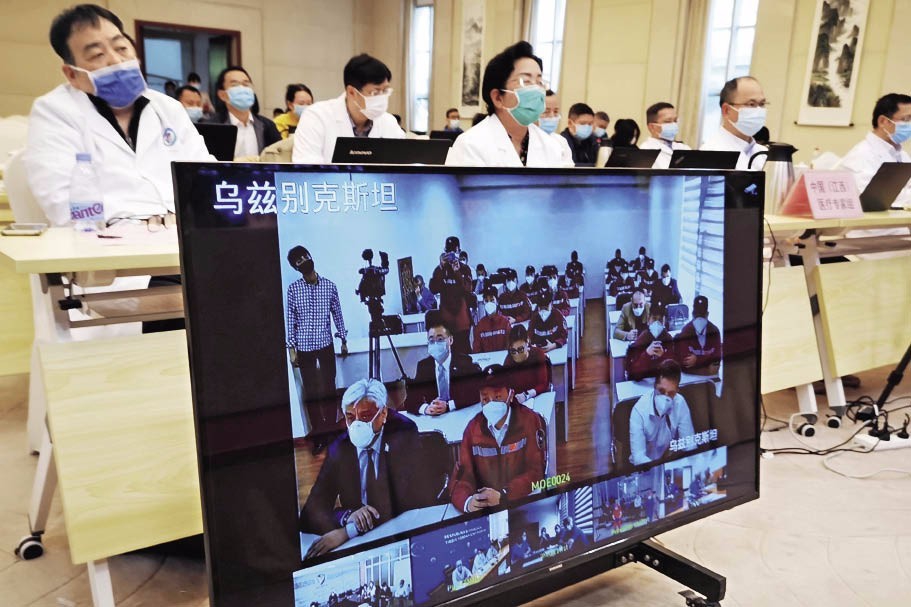
Relying on the Jiangxi provincial remote medical service platform, the China-Uzbekistan cross-border remote medical system is formally put into use on April 25.
Then, just as the world was drifting apart politically and economically, with the divide between the unipolarists and the multipolarists ever widening, the war against COVID-19 broke out.
The COVID-19 pandemic has proven to all that we humans are one big community. Human beings may have different dreams, however, we all go to bed under the same sky every night. Challenges will be numerous in a post-COVID-19 world. Now, severe food and water insecurity, alongside unprecedented economic upheavals, is leading to a spike in unemployment around the world.
United Nations (UN) Secretary-General António Guterres is an unhappy man right now. The collective and positive sentiment that prevailed globally when the 2030 Agenda for Sustainable Development was adopted in 2015 is no longer present. This is demonstrated by the absence of joint international actions to stand up to COVID-19, aside from the efforts of some stakeholders, businesses, organizations, and researchers to mitigate the risk and impact of this unprecedented global emergency.
This notwithstanding, in March 2020 Gutteres called for an immediate ceasefire in all world conflict zones, opening up of the windows of diplomacy, and bringing hope to places where the most vulnerable human beings face COVID-19.
Perhaps in the hope that the UN would again assume its collective role as a guardian of international peace and security, while the world fights the deadly COVID-19 pandemic, Guterres advocated that the world must turn to “science and solidarity,” not least to combat the spreading of “the global misinfo-demic.” Undeniably, the current pandemic underlines the importance of accurate scientific knowledge provided by trusted national science advisory mechanisms to guide political decisions. We have witnessed how political leaders in some countries only paid lip service to science-based advice and pushed their countries to the brink of catastrophe. In their cases, after initially disregarding the assertions and data provided by science advisors, they rather belatedly changed course.
Guterres must likewise be disappointed with the deplorable failure of regional groupings to respond to the current crisis. For instance, when the pandemic struck Italy, Spain, and other European countries, none of the said countries received any expected aid from their European partners. We can take some comfort, nonetheless, from the fact that humans have more often than not banded together in the face of all kinds of threats. Examples exist of countries sharing and providing medical equipment, test kits, and other essential medical supplies. The example of the Chinese businessman Jack Ma donating 100,000 COVID-19 test kits to Jordan in March 2020 is an encouraging case in point, as well as China’s swift and effective action in providing aid to the people of Italy.
In all its ramifications, COVID-19 threatens to push our social, political, and economic systems to the brink of disaster. Disease and recession lead to mass unemployment, and uncertainty can overpower individuals, societies, and states. The immediate future will bring increased challenges that can only be met by caring for the sick, minimizing the impact of lockdowns on the lives of human beings, securing the delivery of adequate water, food, and energy supplies, and, on the research front, scrambling for a vaccine and a cure.
To manage the socio-political and socio-economic fallout on our post-COVID-19 world, society’s leaders should focus on human dignity and welfare as the foundation of national and international security. Our post-COVID-19 world will witness extraordinary tumult with governments struggling to maintain social order and upholding security while generally adopting good governance practices. Long-term security in most countries can only be achieved by assuring food, water, and energy security, combined with sustainable and equitable socio-economic development. Regional insecurity is heightened in the absence of cooperation, which has to again become the norm in the face of existential threats both regionally and globally.
The 2030 Agenda continues to represent a political manifesto for the post-COVID-19 world over the next decade. Based on the principle of universality, it nevertheless allows every country to contribute to achieving the larger vision of sustainable global development without dispensing with its national development agenda. It aims to transform our world by addressing the interconnected root causes of poverty, hunger, pandemics, environmental degradation, climate change, and migration. It promulgates a global partnership that will work in a spirit of solidarity, with the poorest people in particular, as well as with people in vulnerable situations.
The spirit of the 2030 Agenda for Sustainable Development has to be cultivated again. Revisiting the Agenda is necessary to factor in new health and globalization parameters as well as elements that have come to undermine the foundation of contemporary society with rampant inequality and rising injustice, and which threatens the very survival of humankind with climate change. The revised Agenda has moreover to extend the ethic of human solidarity beyond the contours of our immediate response to the outbreak of COVID-19.
The Agenda is people-centered, putting human rights and social justice at its core. Its manner is not dissimilar to China’s National People’s Congress (NPC), which during its 2020 session, held in May 2020, deliberated and passed the government work report, which specified the country’s task in 2020 is to win the battle against poverty without setting a specific economic growth target for the year, while aiming to create more than nine million new urban jobs and keep the registered urban unemployment rate of around 5.5 percent.
In line with the 2030 Agenda for Sustainable Development, at this year’s session, the NPC stressed the people-centered philosophy, particularly adhering to “people first” in coordinating pandemic control and economic and social development.
Now, humanity’s real triumph does not lie in re-discovering the principles of justice, solidarity, mutual respect, and partnership while defeating the coronavirus, but in institutionalizing these values in the days, weeks, and months ahead.